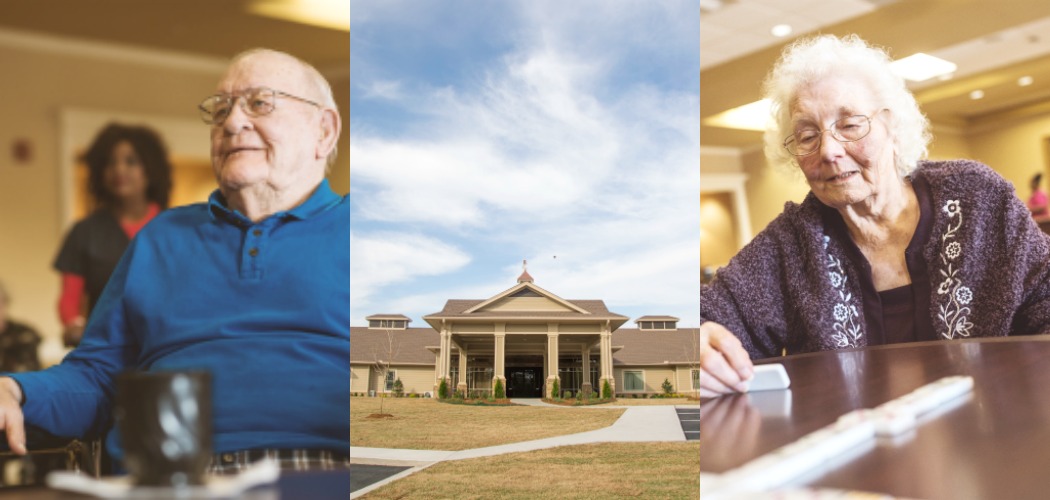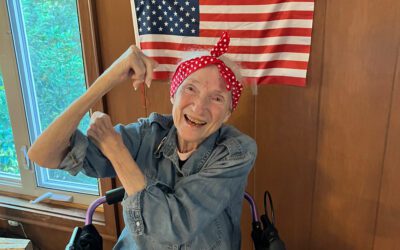[title subtitle=”WORDS Dwain Hebda
IMAGES courtesy of Methodist Village “][/title]
Melissa Curry, chief executive officer of Methodist Village Senior Living in Fort Smith, doesn’t spend a lot of time quoting national statistics. It doesn’t much matter to her that there are nearly eighty million Baby Boomers in the United States, or that an estimated ten thousand of them reach retirement age every day.
It’s not that Melissa isn’t as intrigued by such numbers as the next person or that she doesn’t recognize that this segment is the heart and soul demographic for Methodist Village. It’s just that she and her erstwhile team are so focused with serving people locally, they don’t have much time to worry about the rest of the country.
It’s a single-minded philosophy that pays off every day here in quality, compassionate care.
“Nursing homes used to be, honestly, a place where you went to die,” she says. “Here at Methodist, we believe it’s a place where you can begin to live.”
Methodist Village is unique in the River Valley, offering living options from independent apartments (forty-two) to assisted living units (twenty-six) to secured memory care units (nineteen). It also operates a one hundred forty-five bed long-term care unit, dual certified to provide rehab or standard full-time nursing care. It is the fifth-largest nursing home in Arkansas. The community opened its various living options in phases – the nursing home opened in 1961, independent living in 1972 and the assisted living and memory unit in April – to adapt to care trends and needs within the community. The entity has demonstrated a keen instinct in this regard; in less than six months, its assisted living unit is nearly eighty percent full and expected to be completely occupied by early fall.
“We were seeing a lot of individuals who could no longer live independently. However, they were too mobile or too independent to live in a long-term care facility,” Melissa says. “That was when we made the decision to offer assisted living. With the Baby Boomers coming up, our community really needed that.
“We were also seeing more and more Alzheimer’s and dementia patients and that’s why we made part of [assisted living] a secure facility.” Methodist Village’s offerings are the latest expression of serving the most vulnerable in Fort Smith.
“We are a faith-based nonprofit with a wonderful history,” Melissa says. “Here on our campus years ago, we used to be a tuberculosis center. Once the tuberculosis was vaccinated and gotten rid of, the city started a kind of pauper’s nursing home.”
The venture proved too much for the city to handle and so it deeded the property over to the Methodist Church on the stipulation the Methodists would use it to continue to care for the community’s seniors. After years of being directly managed by the church, Methodist Village formed as a 501(c)(3) nonprofit and operates as such today.
“We serve all people, absolutely,” Melissa says. “We have people from all over Fort Smith, the River Valley, even different states. With our Alzheimer’s unit opening up, we have people from as far as the east and west coasts coming in.”
As the community has grown and expanded, staffing needs have grown right along with it, currently numbering more than two hundred. This, Melissa says, is the most difficult challenge on the operational side, attracting and retaining skilled, compassionate employees.
“Recruiting and retaining good people in health care is very difficult,” she says. “It’s challenging across the country. We’ve done several things to try to recruit and retain our employees.”
For example, management goes to great lengths in scheduling to accommodate as many different schedules as possible. A goal is to one day construct daycare facilities as an employee perk, to help out working parents.
“Some people want to work just weekends. Some people want to just work nights,” Melissa says. “Whatever best fits their schedule is what we’re trying to work with.”
“We have a lot of single parents now and they don’t have that support that maybe we had growing up to help take care of their children. We’re trying to work around those things as well.”
Adding to the challenge of staffing are state requirements the facility must meet under the terms of its licensure. This means having nurses and certified nursing assistants on staff during certain shifts. Nurses, CNAs and other workers are scarce enough; finding some who are experienced with seniors or dementia patients is as rare as finding gold in your backyard. That’s what prompted Melissa and her team to devise a robust training program to help round out all staffers’ skillsets.
“We are probably the only community of our type that has a training center on campus,” Melissa says. “All of our new employees go through at least thirty hours of dementia training before they begin work there. That’s just not for CNAs or nurses, that’s for our maintenance, for dietary. We spend a lot of resources educating our employees, so they are better trained to take care of someone that has Alzheimer’s or related dementia.
“When people are trained to take care of someone with Alzheimer’s they’re less frustrated in redirecting them. Sometimes people get scared to take care of someone who has Alzheimer’s and we lose those people because they’re just too scared to do their job. But if we train them to really care for someone and do a lot of hands-on, then they’re more comfortable.
“Just because somebody has Alzheimer’s or dementia does not mean that they can’t have a happy remainder of their life. A lot of times people try to bring them back into our world and what we really need to do is walk into theirs.”
Methodist Village daily reinforces this refreshing view of residents, even the ones whom age has dealt the unkindest hand, through programming. The very serious business of providing senior care is punctuated with fun and a sense of joy through activities and celebrations. The secret weapon, though, is the throwback Candy Striper program which gives young people in the community a chance to both volunteer and make connections with the older generation.
“Years ago, they used to have Candy Stripers at hospitals, and we brought that here,” Melissa says. “Right now, we have about twenty-seven young people, ages fourteen and up, who come different days of the week, different shifts. We let them choose. They have the original Candy Striper uniform. They go through the orientation training just like anyone else. They come and they read, they do arts and crafts, they paint fingernails, they talk to the veterans about different things that they’ve experienced.
“It’s really helped the morale of our residents to have younger people around. It’s helped our staff with activities. And, that Candy Striper gets experience in volunteering that they can put on their college application. We’re very proud of our Candy Stripers and the things they are doing in this program.”
Despite having just opened its most recent addition in April, Methodist Village is already ambitiously looking to the future. This fall, the organization will begin a capital campaign for a designated inpatient/outpatient therapy center and hopes to break ground on the new facility soon. Melissa says as much as the organization has served the community, the community has been as generous in support of its mission.
“Fort Smith is a very giving community,” she says. “They see the need. These seniors have taken care of us. They’ve paved the way for us, and we really believe that we need to provide a great place for them to live, something that they’re proud of and that they’re proud to bring their family members and friends to see, too. That’s what we want to accomplish here.”
Methodist Village Senior Living
7811 Euper Lane, Fort Smith, Arkansas
479.452.1611
methodistvillage.com




